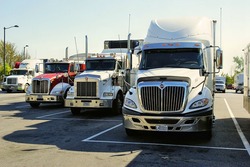
With their large size and high speeds, trucks represent a major safety risk and are involved in thousands of fatalities on American highways each year. Last month, the U.S. Department of Transportation proposed a new regulation that would require all large commercial vehicles over 26,000 pounds be equipped with speed limiters. However, not all professional truckers think that’s a good thing.
What are Speed Limiters?
Speed limiters, also called governors, are small devices that are attached to an engine’s ECU — or are sometimes part of the ECU’s software itself — that prevent a vehicle from going faster than a predetermined speed.
What are the Benefits of Speed Limiters?
Speed limiters are already in use by many as an optional feature and are required by law for certain vehicles in the U.K. Proponents claim that these limiters save lives by preventing speeding, reducing both the rate of accidents and severity of damage when they do occur. Speed limiters also come with economic benefits, giving drivers longer equipment life spans and better fuel efficiency; American truckers would be saving potentially $1.1 billion each year on fuel costs alone.
The American Trucking Associations is among the trucker trade organizations that have voiced support, having advocated for speed limiters with a maximum of 68 mph since 2006. The Trucking Alliance also backs the proposed law with the caveat that all new and existing trucks must be required to install limiters. According to this organization, allowing exceptions would encourage some to subvert the law, endangering other motorists.
Do Speed Limiters Come With Any Risks?
Not all trucker organizations agree with the proposed rule. The Owner-Operator Independent Drivers Association has taken the stance that speed limiters would make roads more dangerous for all drivers. OOIDA Executive Vice President Todd Spencer explains its position, “Highways are safest when all vehicles travel at the same relative speed.” Opponents contend that speed limiters take control away from drivers, making them unable to keep up with the flow of traffic. Additionally, the proposed limit of 68 mph is slower than that of major highways in most states, suggesting this may indeed be a safety issue.

